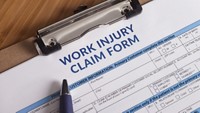Advertisement
Grab your lab coat. Let's get started
Welcome!
Welcome!
Create an account below to get 6 C&EN articles per month, receive newsletters and more - all free.
It seems this is your first time logging in online. Please enter the following information to continue.
As an ACS member you automatically get access to this site. All we need is few more details to create your reading experience.
Not you? Sign in with a different account.
Not you? Sign in with a different account.
ERROR 1
ERROR 1
ERROR 2
ERROR 2
ERROR 2
ERROR 2
ERROR 2
Password and Confirm password must match.
If you have an ACS member number, please enter it here so we can link this account to your membership. (optional)
ERROR 2
ACS values your privacy. By submitting your information, you are gaining access to C&EN and subscribing to our weekly newsletter. We use the information you provide to make your reading experience better, and we will never sell your data to third party members.
Lab Safety
Who pays when a graduate student gets hurt in a British or French lab?
Medical costs are covered by national health insurance, while other financial support varies
by Benjamin Plackett, special to C&EN
April 27, 2021
| A version of this story appeared in
Volume 99, Issue 16

In 2018, Shiva Dastjerdi, a PhD student at Boston University, got a chemical burn on her upper chest. She subsequently had to hire a lawyer to get the school to pay her medical bills, raising the question: Are graduate students eligible for the same benefits available to other workers if they are injured on the job—in Dastjerdi’s case, doing research for her dissertation?
A previous C&EN investigation found that the answer is far from clear in the US. Looking at Europe, using the UK and France as examples, C&EN finds that faculty and university administrators are confident that graduate students are better cared for. But the extent of that care depends on the student’s status, the institution’s insurance policy, and at times, the discretion of the school’s administration.
University accidents that are serious enough to require significant medical treatment or that result in a disability appear to be rare in those countries. “The number of injuries we have that require hospitalization are like hens’ teeth,” says Tim Gallagher, an emeritus professor and former head of the School of Chemistry at the University of Bristol, in the UK. “However, it would be quite hard to put an exact figure on it, and I’m not sure nationwide data like that exist in a centralized way,” he says.
That sentiment is echoed by academics on the other side of the English Channel. “I’ve seen a lab fire and something explode once, but it wasn’t an especially big problem. In my 30-year career, I’ve seen a few minor things, but no one has ever been seriously injured,” says Clotilde Policar, dean of science studies at the École normale supérieure, in France.
Nevertheless, as Dastjerdi’s story illustrates, graduate students should know what support they might—or might not—get if they are hurt in the lab.
Medical bills are not a worry
No injured graduate student in the UK needs to worry about medical bills after an accident. That’s thanks to the National Health Service, which offers free medical coverage at the point of care for British nationals and foreign students. The health service is funded primarily through the British tax system; foreign students also contribute via visa fees.
Graduate students in France also get national medical coverage. Foreign PhD students have the same rights to health care as French students, says Olivier Dauteuil, director of geosciences at the University of Rennes 1, in France. That’s also the case for most foreign master’s and bachelor’s students—unless they’ve fallen behind on their tuition payments. “If they didn’t pay, then it largely depends on the country they come from and what agreements have been signed between the two countries,” Dauteuil says. “In that scenario, the government would first pay and then seek reimbursement. No one ever would be refused medical care.”
Short-term financial support is less clear
When it comes to financial support beyond the immediate medical bills, the rules start to diverge slightly. In France, all PhD students are classed as employees, meaning that while they recover from an injury, they are entitled to sick pay, which is roughly 80% of their normal pay.
In the UK, only a few PhD students are classed as employees by their universities. British employers are legally required to pay a minimum of £95.85 (roughly $130) per week for up to 28 weeks if an employee cannot come to work because of injury or illness. However, surveys have shown that most employers go beyond the legal minimum and provide more generous terms, akin to what employees get in France.
Instead, most PhD researchers in the UK are considered to be students and not entitled to any sick pay. “This is a topic that’s been ignored for too long,” says Tim Brown, a former general secretary of the National Postgraduate Committee, a nonprofit group that advocates for UK graduate students.
This student status makes graduate researchers something of an anomaly in Europe, Brown says. “In the rest of Europe, they’re basically all employees, and they think we’ve got it wrong in the UK.”
Being categorized as a student in the UK brings other benefits, though. For example, students are exempt from some forms of taxes, and bringing a foreign student into the country is substantially easier than bringing a foreign employee. So any change to a PhD researcher’s status needs to be carefully considered, Brown says.
UK master’s students are also not considered employees, but that’s the case in most other European countries too, including France.
There are ways that UK universities can support an injured student researcher, however. As head of the School of Chemistry, Gallagher “had access to what’s called a hardship fund, and it can cover a whole range of things,” he says. He could use the money to alleviate any short-term financial needs of a graduate student after a lab accident. “Such a payment would be made without any admission of liability, and it’s done on a discretionary basis,” Gallagher adds.
Long-term support might require a lawsuit
But if UK graduate students become permanently disabled in a lab accident and need long-term support, they’d need to sue the university.
“They would have to prove that the university is at fault,” Gallagher says.
Any award would come out of liability insurance that universities, like other UK employers, are required to carry. Minimally, they must have insurance to cover compensation claims up to £5 million ($7 million) per claim, although many universities are insured to a much higher figure. The University of Bristol, for example, is covered with an indemnity limit of £50 million, according to Gallagher.
In Gallagher’s experience, a university might not even fight a lawsuit. “This isn’t something that we duck or dive to save pennies. We see it as a mechanism to deal with issues where the university is liable,” Gallagher says. “The reputational damage of screwing over young people is too high, and the quicker something can be dealt with, the happier everyone is.”
But none of these payments are automatic. A university and its lawyers could challenge the grievance if they didn’t believe the university was at fault. “If there’s no negligence, then we’d defend it because it is possible to get frivolous claims,” Gallagher says.
If the university either accepts fault or loses a court case, the insurers and legal system calculate exactly how much should be owed based on the severity of the injury and the resulting lost income—both past and future. “There are calculations that work out what you’d have earned by the time you retire, and there’s an algorithmic approach to how these claims are settled in the legal system,” Gallagher says.
France has a similar system for long-term disability. “If they’re a PhD researcher, then it’s quite simple because they’re an employee,” Dauteuil says. “But for a master’s or bachelor’s student, it is more complex.” Those students are obliged to sign a detailed agreement with the university before even entering a lab. This agreement specifies the types of experiments they are allowed to conduct and in which labs they can do those experiments.
“If they have an accident in another lab or another building, then that can be a big problem. We therefore have to be really careful to get the agreements written correctly,” Dauteuil says. An accident in a location outside the areas covered by the contract would complicate proceedings with the insurance company, potentially leaving the university exposed to make compensation payments out of pocket. “If a student doesn’t have an agreement or a correct agreement and they were injured, then it’s my fault because it’s my responsibility to know who is in the lab,” Dauteuil says.

Benjamin Plackett is a freelance writer based in the UK. A version of this story first appeared in ACS Chemical Health & Safety: cenm.ag/workerscompukfr.




Join the conversation
Contact the reporter
Submit a Letter to the Editor for publication
Engage with us on Twitter